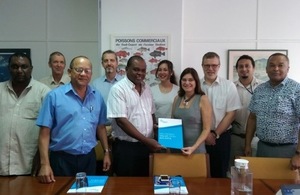IEA (Seychelles) Renewable Energy Support
Informing the deployment of Renewable Energy in Small Island Developing States using Space Data

RESAT project team visiting international partners in the Seychelles. Credit: IEA.
Project title
RE-SAT: Renewable Energy Space Analytics Tool
Target Country
Small Island Developing States, focusing on the Seychelles in Phase 1
Project Lead
Institute for Environmental Analytics (IEA), UK.
Project consortium
University of Reading, UK, BuroHappold Engineering
International partners
Government of the Seychelles Ministry of Environment, Energy and Climate Change (MEECC) United Nations Development Programme (UNDP)
Project summary
Our aim is to use earth observation (EO) and other data sources to support Small Island Developing States (SIDS) in their transition from fossil fuel electricity generation to renewables by developing a proof-of-concept energy planning tool.
SIDS are a group of developing countries facing specific social, economic and environmental vulnerabilities, including a heavy dependence on external markets and the high cost of energy. Yet SIDS have enormous potential to be energy-independent due to their natural renewable energy resources. However renewable supply fluctuates with changes in weather so reserve capacity must be invoked from traditional energy generation methods at short notice.
Understanding temporal variability is a key question as this affects the requirement for reserve energy generation, however, long periods of historic observations are often not available. Our premise is that historic EO data can be combined with ground observations and weather models to generate realistic “synthetic” time series of historic observations of insolation and wind to simulate the impact of weather variability on a SIDS’ overall energy grid.
Our vision aligns with the UN sustainability goal on “Affordable and Clean Energy” and with the Energy Strategy of the Government of Seychelles of developing a road-map for 100% renewable energy by 2050.
Objective
To develop a proof-of-concept analytics tools for planners and technical specialists developing options and strategies for renewable energy in Small Island Developing States (SIDS) that:
- Provides a detailed estimating tool for renewable resources in a specific country.
- Quantifies weather-related risks for renewable energy.
- Exploits existing space data, weather models and other environmental data sources.
- Allows the capture of methodologies, results and insights from studies for a specific country to aid planning in other SIDS.
The proof-of-concept is to be demonstrated by developing models using EO and other data sources to reduce the uncertainty in variability estimates for solar and wind power in the Seychelles.